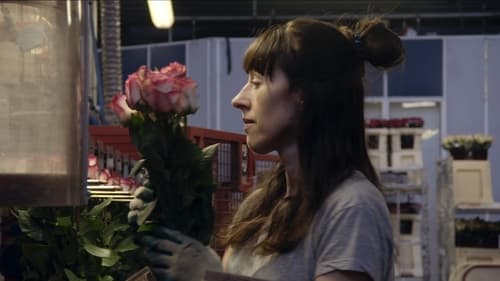Eric Baudelaire
出生 : 1973-01-31, Salt Lake City, Utah, U.S.

Director
Rome, years of lead. Aldo Moro is kidnapped in the fervor of the Red Brigades. The armed struggle is propelled towards a political dead end. Alvin Curran, mythical figure of the musical Avant-Garde, strives to dissolve the figure of the author in the collective. The notion of instruments is extended to natural and everyday objects, producing revolutionary works.

Screenplay
A Flower in the Mouth is a film diptych about time running out and how to live through the days that remain. The first act, filmed as an observational documentary in the world’s largest flower market, follows millions of bouquets transiting through a cavernous refrigerated hangar to be sold at auction, an industrial process at once both beautiful and terrifying. The film transitions to fiction in a second act freely adapted from a Pirandello play. A man with a flower-shaped tumour on his lip accosts a traveller in an all-night café. Their seemingly mundane conversation becomes a metaphysical monologue as the man, feeling death approach, clings to life by scrupulously observing its activity, watching reality in every detail, as if to fill the gap between himself and the rest of the world.

Director
A Flower in the Mouth is a film diptych about time running out and how to live through the days that remain. The first act, filmed as an observational documentary in the world’s largest flower market, follows millions of bouquets transiting through a cavernous refrigerated hangar to be sold at auction, an industrial process at once both beautiful and terrifying. The film transitions to fiction in a second act freely adapted from a Pirandello play. A man with a flower-shaped tumour on his lip accosts a traveller in an all-night café. Their seemingly mundane conversation becomes a metaphysical monologue as the man, feeling death approach, clings to life by scrupulously observing its activity, watching reality in every detail, as if to fill the gap between himself and the rest of the world.

Writer
Sometimes you feel like an inflated prophylactic glove, and you almost want to jump out the window.

Director
Sometimes you feel like an inflated prophylactic glove, and you almost want to jump out the window.

Producer
Artist and filmmaker Eric Baudelaire spent four years interacting with the pupils of a film class, at a secondary school in the Parisian suburb of Saint-Denis. Keeping himself on the sidelines, he gives way to the children to express their thoughts and dreams. Their remarks are intuitive, inquisitive, yet passionate and surprisingly mature, concerning rocky and complicated issues, ranging from racism, immigration, and identity, all the way to the possibilities of film as a medium. As time flows almost unnoticed, it is evident that these children have not only become the co-directors of this film but also the heroes of their own lives.

Director
Artist and filmmaker Eric Baudelaire spent four years interacting with the pupils of a film class, at a secondary school in the Parisian suburb of Saint-Denis. Keeping himself on the sidelines, he gives way to the children to express their thoughts and dreams. Their remarks are intuitive, inquisitive, yet passionate and surprisingly mature, concerning rocky and complicated issues, ranging from racism, immigration, and identity, all the way to the possibilities of film as a medium. As time flows almost unnoticed, it is evident that these children have not only become the co-directors of this film but also the heroes of their own lives.

Thanks
A delicate portrait of Mei Shigenobu, daughter of the founder of the Japanese Red Army in Beirut, Fusako Shigenobu.

Director
Holding the camera in front of him, Eric Baudelaire walks through Rome and Paris and records soldiers moving about in the metropolis in pairs or small groups. They are heavily armed but usually appear relaxed, observing their surroundings or chatting with each other. People populating the streets walk around them quite naturally, pursuing their everyday lives. They are listless passers-by, innocent civilians, residents of the city, and tourists.

Writer
Also Known as Jihadi follows the progress of a young man's journey from France to Syria, and back to France, where he is incarcerated for allegedly joining Daesh. Based on real events, and drawn from thousands of pages of judicial documents, the work employs the so-called landscape theory (fukeiron in Japanese). The character's paths to radicalism are rendered purely through a series of landscape shots filmed at the locations traversed by the subject: a biography determined not by what the subject did, but by what the subject saw, and one that questions how these landscapes reflect the social and political structures that are the backdrop for a journey of alienation and return.

Director
Also Known as Jihadi follows the progress of a young man's journey from France to Syria, and back to France, where he is incarcerated for allegedly joining Daesh. Based on real events, and drawn from thousands of pages of judicial documents, the work employs the so-called landscape theory (fukeiron in Japanese). The character's paths to radicalism are rendered purely through a series of landscape shots filmed at the locations traversed by the subject: a biography determined not by what the subject did, but by what the subject saw, and one that questions how these landscapes reflect the social and political structures that are the backdrop for a journey of alienation and return.

Writer
A record of the epistolary encounter between French artist and filmmaker Eric Baudelaire and Maxim Gvinjia, former Foreign Minister of the breakaway Caucasian state of Abkhazia, Letters to Max is both a chronicle of a developing friendship and an ingenious, unusual essay film about the inherently speculative nature of nationhood.

Director of Photography
A record of the epistolary encounter between French artist and filmmaker Eric Baudelaire and Maxim Gvinjia, former Foreign Minister of the breakaway Caucasian state of Abkhazia, Letters to Max is both a chronicle of a developing friendship and an ingenious, unusual essay film about the inherently speculative nature of nationhood.

Editor
A record of the epistolary encounter between French artist and filmmaker Eric Baudelaire and Maxim Gvinjia, former Foreign Minister of the breakaway Caucasian state of Abkhazia, Letters to Max is both a chronicle of a developing friendship and an ingenious, unusual essay film about the inherently speculative nature of nationhood.

Director
A record of the epistolary encounter between French artist and filmmaker Eric Baudelaire and Maxim Gvinjia, former Foreign Minister of the breakaway Caucasian state of Abkhazia, Letters to Max is both a chronicle of a developing friendship and an ingenious, unusual essay film about the inherently speculative nature of nationhood.

Director
Adashi, ex-member of the Japanese Red Army, narrates a story taking place in Beirut. The melancholy of war, the pain of disillusionment. A story being written and rewritten, open to interpretation. When the time comes, return to reality can only be cruel.

Writer
A film on exile, revolution, landscapes and memory, Anabasis brings forth the remarkable parallel stories of Adachi and May, one a filmmaker who gave up images, the other a young woman whose identity-less existence forbade keeping images of her own life. Fittingly returning the image to their lives, director Eric Baudelaire places Adachi and May’s revelatory voiceover reminiscences against warm, fragile Super-8mm footage of their split milieus, Tokyo and Beirut. Grounding their wide-ranging reflections in a solid yet complex reality, Anabasis provides a richly rewarding look at a fascinating, now nearly forgotten era (in politics and cinema), reminding us of film’s own ability to portray—and influence—its landscape.

Editor
A film on exile, revolution, landscapes and memory, Anabasis brings forth the remarkable parallel stories of Adachi and May, one a filmmaker who gave up images, the other a young woman whose identity-less existence forbade keeping images of her own life. Fittingly returning the image to their lives, director Eric Baudelaire places Adachi and May’s revelatory voiceover reminiscences against warm, fragile Super-8mm footage of their split milieus, Tokyo and Beirut. Grounding their wide-ranging reflections in a solid yet complex reality, Anabasis provides a richly rewarding look at a fascinating, now nearly forgotten era (in politics and cinema), reminding us of film’s own ability to portray—and influence—its landscape.

Director of Photography
A film on exile, revolution, landscapes and memory, Anabasis brings forth the remarkable parallel stories of Adachi and May, one a filmmaker who gave up images, the other a young woman whose identity-less existence forbade keeping images of her own life. Fittingly returning the image to their lives, director Eric Baudelaire places Adachi and May’s revelatory voiceover reminiscences against warm, fragile Super-8mm footage of their split milieus, Tokyo and Beirut. Grounding their wide-ranging reflections in a solid yet complex reality, Anabasis provides a richly rewarding look at a fascinating, now nearly forgotten era (in politics and cinema), reminding us of film’s own ability to portray—and influence—its landscape.

Director
A film on exile, revolution, landscapes and memory, Anabasis brings forth the remarkable parallel stories of Adachi and May, one a filmmaker who gave up images, the other a young woman whose identity-less existence forbade keeping images of her own life. Fittingly returning the image to their lives, director Eric Baudelaire places Adachi and May’s revelatory voiceover reminiscences against warm, fragile Super-8mm footage of their split milieus, Tokyo and Beirut. Grounding their wide-ranging reflections in a solid yet complex reality, Anabasis provides a richly rewarding look at a fascinating, now nearly forgotten era (in politics and cinema), reminding us of film’s own ability to portray—and influence—its landscape.

Director
An adaptation of Michelangelo Antonioni’s notes on un-made films published in “That Bowling Alley on the Tiber.” Starring French film critic Philippe Azoury in the role of “The Critic.”
![[sic]](https://moviedb.kr/index.php/image/w500/j7spYDSCQoz6gHcaEt82jOTpEqI.jpg)
Writer
Artist Eric Baudelaire constructed an ‘imaginary reality’ after a sojourn in Kyoto. In an art bookstore, a girl is responsible for ‘bokashi’: obscuring images. The entire book collection has passed through her hands. She determines what we can and cannot see.
![[sic]](https://moviedb.kr/index.php/image/w500/j7spYDSCQoz6gHcaEt82jOTpEqI.jpg)
Director
Artist Eric Baudelaire constructed an ‘imaginary reality’ after a sojourn in Kyoto. In an art bookstore, a girl is responsible for ‘bokashi’: obscuring images. The entire book collection has passed through her hands. She determines what we can and cannot see.

Director
The action takes place on a Paris metro platform where a billposter covers a large advertising billboard with a sequence of images that depict a car parked on a Parisian street that bursts into flames, becomes swallowed up in smoke, and then remains only as a skeleton of the former car. Using a laborious traditional system to mount the details of each image, this cinematic event gradually unfolds over the 72-minute film, offering a slow contemplative consideration of political violence as a counterpoint to the rapid barrage of images we typically experience in our news media. Despite its slow, nearly meditative pace, Baudelaire creates a haunting and provocative work that completely absorbs the viewer.





















![[sic]](https://moviedb.kr/index.php/image/w500/j7spYDSCQoz6gHcaEt82jOTpEqI.jpg)
![[sic]](https://moviedb.kr/index.php/image/w500/j7spYDSCQoz6gHcaEt82jOTpEqI.jpg)
